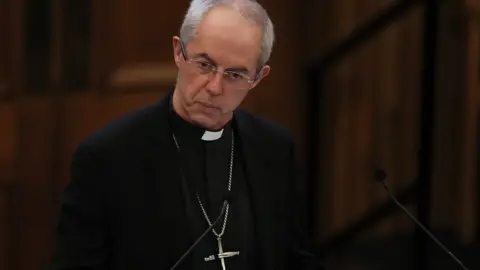Archbishop of Canterbury calls for radical economic reform
 Dan Kitwood
Dan KitwoodThe Archbishop of Canterbury, Justin Welby, says Britain's economic model is broken, as the gap between the richest and poorest parts of the UK widens.
Britain stands at a watershed and must make "fundamental choices" about the direction of the economy, he said.
The remarks come in a report by a commission set up by the centre-left Institute for Public Policy Research.
The UK Treasury said: "Employment is at a record high, the deficit is down and inequality is at a 30-year low."
The IPPR's interim Commission on Economic Justice report says the UK economy is the most unbalanced in Europe, and contains more workers overqualified for their jobs than the rest of the European Union.
Britain's economic model is simply unfit for the 2020s, the IPPR argues. The organisation proposes a "fundamental reform" of the economy, on a scale comparable with the Atlee reforms of the 1940s and the Thatcher revolution of the 1980s.
Committee members include the Archbishop, along with leading figures from business and civil society.
The archbishop said: "Our economic model is broken. Britain stands at a watershed moment where we need to make fundamental choices about the sort of economy we need.
"We are failing those who will grow up into a world where the gap between the richest and poorest parts of the country is significant and destabilising."
The report sets out new analysis which suggests that, although GDP per head has risen by 12% since 2010, average earnings per employee have fallen by 6%.
Wage share
It says that since the 1970s, the share of national income that has gone to wages has gradually declined, from 80% to 73%, while the share going to profits has increased. The wage share is now the lowest it has been since the World War Two.
The report says that economic growth and earnings have "'decoupled" since the financial crisis.
It states: "The UK economy no longer translates economic growth into rising earnings. Gains from growth have gone largely into profits rather than wages, and the UK economy is now in the longest period of earnings stagnation for 150 years."
The Commission is calling for an urgent public debate on taxation, the role of the financial sector, the power of trade unions as well as looking at the impact of new company models including Google and Amazon.
Overall, the report's analysis finds that the economy is no longer raising living standards for a majority of the population.
It says this growth was a "promise" that has underpinned public life since 1945 and the economy's deep weaknesses make it "unfit" to face the challenges of the 2020s.
A Treasury spokesman said the government was proud of its record but there was more to be done: "That is why we are investing £23bn in infrastructure, R&D and housing, while also reforming technical education to prepare for the high paid, high skilled jobs of the future."
Among the main points of the IPPR's research:
- The UK is experiencing the longest period of earnings stagnation for 150 years, and young people today are set to be poorer than their parents
- The UK is the most geographically unbalanced economy in Europe, with 40% of output produced in London and the South East and average incomes in the North West, South West, West Midlands and Wales now more than 30% lower than in London
- The labour market is increasingly casualised, with more workers on low pay than 10 years ago, 3% of the workforce on zero-hours contracts and more employees overqualified for their jobs than anywhere else in the EU
- The UK is the most unequal of western European countries, with nearly a third of children living in poverty. More of the poor now live in working households (54%) than in non-working households (46%).
The report calls for public debate on a range of reforms, including:
- A fairer and simpler tax system, that incentivises economic "goods" such as investment and employment and dis-incentivises "bads" such as pollution and property prices. It suggests that taxes could be "hypothecated", or earmarked for health and social care
- A better distribution of wealth, potentially through new taxes and a sovereign wealth fund to better distribute national wealth
- Much greater economic power for the UK's nations and regions, including greater "fiscal devolution" and regional banks to support local economies
- Stronger trade unions, to help raise wages and protect workers in the "gig economy"
- Better regulation and taxation of monopoly digital companies to ensure that data created by consumers is used for public benefit and supports widespread innovation.
As well as the Archbishop of Canterbury, the IPPR commission's members include Sir Charlie Mayfield, the chairman of John Lewis, Juergen Maier, the chief executive of German electronics giant Siemens, and Frances O'Grady, the general secretary of the TUC.